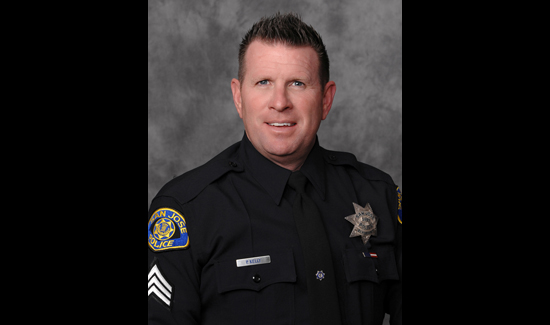Police Pensions Saved—For Now

Paul Kelly, president of the San Jose Police Officers Association
The San Jose Police Officers Association has been fighting Chuck Reed’s efforts to destroy pensions for over a decade; the cost has been high, but they are winning the war.
Law enforcement officers, teachers, and anyone else who has chosen a life of public service working for California towns, cities, states, and counties are rejoicing.
Yesterday, two of the most committed people dedicated to destroying pensions for public employees, despite the fact that the terms are binding under contract law, took their ball (or should we say sledgehammer), admitted defeat, and went home—at least for now.
Cheers erupted when former San Jose Mayor Chuck Reed and former San Diego Councilman Carl DeMaio announced they were withdrawing their effort to get their pension-slashing measure on the ballot this November.
“Fair and affordable retirement security that provides for the care of police officers injured in the line of duty is critical for local jurisdictions to recruit and retain officers to keep our neighborhoods safe,” said Paul Kelly, the president of the San Jose Police Officers Association. “Unfortunately, Chuck Reed and Carl DeMaio never understood the importance of investing in our public safety professionals and recklessly pursued failed pension schemes.”
In San Jose, when Chuck Reed, a Democrat, was mayor, he put cutting pensions at the top of his to-do list. The result was the loss of over 450 police officers, skyrocketing crime, and emergency response times that hovered around 20 minutes to priority two calls.
“Recently, the City of San Jose agreed to abolish Reed’s pension measure and replace it with a competitive and affordable alternative that protects officers injured in the line of duty” Kelly continued. “That replacement is still not finalized. But the Reed pension experiment is still causing anxiety and a diminished quality of life for the residents of San Jose. The next police academy has just nine cadets. There is room for 30.”
According to an in-depth story in the Sacramento Bee by Jon Ortiz, the effort to get the measure on the ballot was pulled due to lack of support. When push came to shove, very few were willing to send money or go out and knock on doors. The cost of getting a measure on the California ballot is around $28 million.
Dave Low, chairman of the union-backed Californians for Retirement Security, questioned whether “donors will have any confidence in these two failed politicians who have repeatedly bungled efforts” to put a proposal on the ballot.
Reed and DeMaio’s announcement marked the latest in a decade-long string of unsuccessful attempts to put a pension measure before California voters, although both men were behind successful local ballot measures in 2012 intended to cut into pension costs that they said had eroded their respective cities’ core services.
One measure, which Reed said didn’t poll well this month, would have put employees who first join a public pension system on or after Jan. 1, 2019 into 401(k)-style retirement savings plans that guarantee fixed contributions from employers instead of guaranteeing retirement payouts by government agencies. The second measure would have capped how much employers could pay for new hires’ retirement benefits to a certain percentage of their salary.
Internal discussions, Reed said, turned to 2018. By then, some of his advisers speculated, the state economy might cool down, putting state and local budgets under more stress and giving voters more reason to pay attention.
There would also be no election for president that year, he noted, which tends to suppress turnout in Democratic, union-friendly California.















Just out of curiosity, why does the article declare that one is a Democrat but fail to mention that the other is a Republican.
They don’t need to. They’re both acting like Republicans. Reed is notoriously a DINO. The sooner they both go away the better!
Chuck Reed is and always will be a disgrace. Period.